《Human rights in states of emergency in international law》
| 作者 | Jaime Oraá 编者 |
|---|---|
| 出版 | Clarendon Press ; New York : Oxford University Press |
| 参考页数 | 288 |
| 出版时间 | 1992(求助前请核对) 目录预览 |
| ISBN号 | 0198257104 — 求助条款 |
| PDF编号 | 813695168(仅供预览,未存储实际文件) |
| 求助格式 | 扫描PDF(若分多册发行,每次仅能受理1册) |
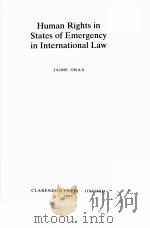
Introduction1
PART Ⅰ.HUMAN RIGHTS STANDARDS IN STATES OF EMERGENCY IN THE CONTEXT OF MULTILATERAL TREATIES:THE LEGAL REGIME OF THE DEROGATION CLAUSE5
Introduction7
1.The Principle of Exceptional Threat:The Existence of the Emergency as Envisaged in the Three Main Multilateral Treaties11
1.Introduction11
2.The Definition of Emergency in the Three Treaties11
(a) The Concept in the Covenant and in the European Convention12
(b) The Wording of the American Convention14
3.The Interpretation Given to the Concept of Emergency by the International Bodies Entrusted with the Application of the Three Treaties16
(a) The Jurisprudence under the European Convention16
(b) The Practice of the UN Human Rights Committee20
(c) The Practice of the IACHR22
(ⅰ) The Doctrine under the American Convention23
(ⅱ) The Principles Applicable to States Non-Parties to the Convention26
4.The Main Features of the Emergency Envisaged in the Treaties27
(a) The Emergency Must be Actual or at Least Imminent27
(b) Its Effects Must Involve the Whole Population28
(c) The Threat Must be to the Very Existence of the Nation29
(d) The Declaration of Emergency Must be a Last Resort29
(e) The Declaration of Emergency as a Temporary Measure30
5.Circumstances in which a Public Emergency can be Declared30
6.Conclusion32
2.The Principle of Proclamation of the State of Emergency34
1.Introduction34
(a) The Requirement of Official Proclamation in the Covenant34
(b) The Absence of this Requirement in the European Convention:Its Effects37
2.The Organ Competent to Proclaim the Emergency:The Legislature and the Executive38
3.Judicial Control40
4.International Control under the Human Rights Treaties42
(a) Under the European Convention42
(ⅰ) The Competence of the European Organs to Control Compliance with the Principles of the Derogation Clause in Exceptional Situations42
(ⅱ) The Construction of the Irish Government:The Principle of Good Faith44
(ⅲ) The Concept of the Margin of Appreciation45
(ⅳ) The Problem of the Burden of Proof47
(b) Under the Covenant:The United Nations Human Rights Committe47
(ⅰ) The Reporting Procedure48
(ⅱ) The Practice of the Committee in Certain Specific Cases49
(c) Under the American Convention:The Control Exercised by the Inter-American Commission on Human Rights51
5.Conclusion55
3.The Principle of Notification58
1.The Rationale of the Principle of Notification58
2.The Contents of the Notice of Derogation or the Formal Requirements of the Principle of Notification60
(a) The Element of Time60
(b) The Contents of the Notice of Derogation61
3.The Effect of the Failure to Comply with the Notification Requirement64
(a) Total Failure to Meet the Notification Requirement:The Question of the Application ex officio of the Derogation Clause in Cases in which no Notification has been Sent66
(ⅰ) The Cyprus Case67
(ⅱ) The Bolivian Case69
(ⅲ) The Attitude of the UN HR Committee69
(b) Partial Failure to Meet the Notification Requirement70
4.The Distinction between the Obligation of Notifying and the Obligation of Providing Information to International Bodies under Other Procedures72
5.The Practice of Notification under the Three Treaties76
(a) The European Convention76
(b) The ICCPR77
(c) The ACHR81
6.Conclusion83
4.The Principle of Non-Derogability of Fundamental Rights87
1.Introduction87
(a) The travaux preparatories of the Three Treaties88
(b) The Rationale behind the List of Non-Derogable Rights94
2.The Four Common Non-Derogable Rights96
3.The Other Non-Derogable Rights under the ICCPR and the ACHR97
(a) Rights Unrelated to Public Emergencies97
(b) Rights which May have an Impact on Public Emergencies100
4.Other Rights and Principles which are Held Non-Derogable by Implication101
(a) Provisions Related to the Exercise of Non-Derogable Rights102
(b) Provisions which Contain General Exceptions103
(c) Provisions Related to the Machinery of Implementation of the Treaties105
5.Study of Several Proposals to Make a priori Non-Derogable Some Minimum Guarantees against Arbitrary Detention and of Due Process of Law106
(a) Introduction106
(b) Guarantees against Arbitrary Detention in Emergencies108
(ⅰ) General Guarantees108
(ⅱ) Minimum Rights of Detainees108
(c) Guarantees of Due Process of Law in Emergencies114
(ⅰ) The Minimum Rights of Due Process115
(ⅱ) The Rights whose Derogation would be Justified in Principle116
(ⅲ) The Right to be Tried by an Independent and Impartial Tribunal118
(ⅳ) The Practice of the HR Committee119
(ⅴ) The Practice under the ACHR121
6.Conclusion124
Appendix:Reservations to Non-Derogable Rights in the Three Human Rights Treaties127
The Three Substantive Conditions for the Derogation of Rights in States of Emergency139
5.The Principle of Proportionality140
1.Introduction140
(a) The Legislative History of the Treaties143
2.The Application of the Principle of Proportionality by the Supervisory Bodies under the Three Main Treaties144
(a) The Principle as Applied by the European Organs in Cases of Emergency144
(b) The Principle as Applied by the UN Human Rights Committee152
(ⅰ) The Review of States' Reports152
(ⅱ) Under the Optional Protocol157
(c) The Application of the Principle of Proportionality under the ACHR159
(ⅰ) The General Principles Formulated by the Inter-American Court159
(ⅱ) The Application of the Principle by the IACHR161
3.Conclusion168
6.The Principle of Non-Discrimination171
1.Introduction171
(a) The Characteristics of the Provision172
(b) The Debate on the Principle of Non-Discrimination as Non-Derogable172
(c) The Introduction of the Principle as a Condition for Derogation173
(d) The Extent of the Provision174
2.The Application of the Principle by the Monitoring Organs under the Three Treaties177
(a) The European Organs:The Ireland v.UK Case177
(b) The Practice of the HR Committee182
(c) The Practice of the IACHR185
3.Conclusion188
7.The Principle of Consistency190
1.Introduction190
2.Legislative History of the Principle in the Three Treaties191
3.The Application of the Principle by the Monitoring Organs under the Three Treaties193
(a) The European Convention193
(b) The UN Human Rights Committee196
(c) The IACHR197
4.The Delimitation of the Content of the Expression 'Other Obligations under International Law'200
(a) The Possible Additional Obligations Arising from the Laws of War201
(ⅰ) Humane Treatment202
(ⅱ) Fair Trial and Due Process of Law204
(ⅲ) Safeguards for Internees in Convention Ⅳ204
5.Conclusion205
PART Ⅱ.HUMAN RIGHTS IN STATES OF EMERGENCY IN GENERAL INTERNATIONAL LAW207
Introduction209
8.Customary International Law and Human Rights:Two Preliminary Questions214
1.The Existence of Human Rights Standards in Customary Law214
2.The Special Evidence Required to Prove the Existence of Customary Norms in the Area of Human Rights216
9.First Line of Inquiry:Human Rights in Emergencies:The Doctrine of State Necessity220
1.Legal Doctrines in International Law which Justify the Non-Compliance with International Obligations in Cases of force majeure,Self-Defence,and Necessity220
2.The Doctrine of State Necessity221
(a) Characteristics221
(b) Conditions of Application222
(c) Decisions of the ILO Organs:the Greek and Polish Cases223
10.Second Line of Inquiry:The Emergence of Some of the Principles of the Derogation Clause as Principles of General International Law227
1.The Legal Nature of the Derogation Clause227
2.Three Types of Principles228
3.The Derogation Clause and Customary International Law:The 'Norm-Creating Character' of the ICCPR and the Derogation Clause229
4.Evidence of the Emergence of Some of the Principles of the Derogation Clause as Customary Law234
(a) The Probative Value of Law-Making Treaties234
(b) The Repetition of the Same Norm in Several Human Rights Treaties234
(c) The Practice of the Organs of International Organizations and Similar Agencies235
(ⅰ) The Practice of the IACHR236
(ⅱ) the Practice of the UN Organs242
(d) The Acceptance of these Principles by States Non-Parties to the Human Rights Treaties253
5.The Application of the Principles of the Derogation Clause to Other Areas of International Law254
(a) State Responsibility for Injury to Aliens (Human Rights of Aliens in States of Emergency in General International Law)254
(b) The Law of Belligerent Occupation:The Case of Israel256
6.The Principles of the Derogation Clause as 'General Principles of Law'257
Conclusion of the Inquiry:The Principles which Constitute Emergent Principles of General International Law Governing Human Rights in States of Emergency260
1.The Principle of Exceptional Threat261
2.The Principle of Proportionality262
3.The Principle of Non-Discrimination263
4.The Principle of Non-Derogability of Fundamental Rights264
Conclusions of Part Ⅱ266
Concluding Remarks270
Bibliography273
Index287
1992《Human rights in states of emergency in international law》由于是年代较久的资料都绝版了,几乎不可能购买到实物。如果大家为了学习确实需要,可向博主求助其电子版PDF文件(由Jaime Oraá 1992 Clarendon Press ; New York : Oxford University Press 出版的版本) 。对合法合规的求助,我会当即受理并将下载地址发送给你。
高度相关资料
-
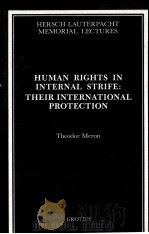
- HUMAN RIGHTS IN INTERNAL STRIFE:THEIR INTERNATIONAL PROTECTION
- 1987 GROTIUS PUBLICATIONS LIMITED
-

- HUMAN RIGHTS TERMINOLOGY IN INTERNATIONAL LAW:A THESAURUS
- 1987 MARTINUS NIJHOFF PUBLISHERS
-

- THE NEW YORK ARBITRATION CONVENTION OF 1958
- 1981 KLUWER LAW AND TAXATION PUBLISHERS
-

- International Human Rights in Context Law Politics Morals Text and Materials
- 1996 Clarendon Press · Oxford
-

- The Burden of Proof in Comparative and International Human Rights Law Civil and Common Law Approache
- 1998 Kluwer Law International
-
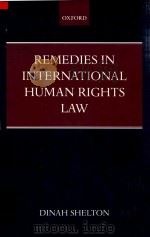
- Remedies in International Human Rights Law
- 1999 Oxford University Press
-

- International Human Rights in A Nutshell Second Edition
- 1998 West Publishing
-
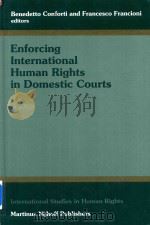
- Enforcing International Human Rights in Domestic Courts
- 1997 Martinus Nijhoff Publishers
-
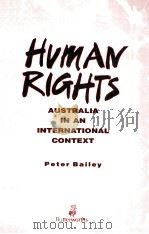
- HUMAN RIGHTS AUSTRALIA IN AN INTERNATIONAL CONTEXT
- 1990 BUTTER WORTHS
-

- ACCOUNTABILITY FOR HUMAN RIGHTS ATROCITIES IN INTERNATIONAL LAW
- 1997 CLARENDON PRESS·OXFORD
-
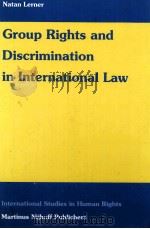
- Group rights and discrimination in international law
- 1991 M. Nijhoff
-

- The international law of human rights
- 1983 Clarendon Press
-
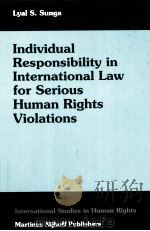
- INDIUAL RESPONSIBLITY IN INTERNATIONAL LAW FOR SERIOUS HUMAN RIGHTS VIOLATIONS
- 1992 MARTINUS NIJHOFF PUBLISHERS
-
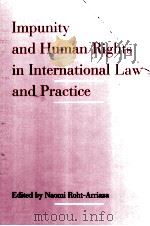
- Impunity and human rights in international law and practice
- 1995 Oxford University Press
-

- INTERNATIONAL LAW AND FACT FINDNG IN THE FIIELD OF HUMAN RIGHTS
- 1982 MARTINUS NIJHOFF PUBLISHERS
提示:百度云已更名为百度网盘(百度盘),天翼云盘、微盘下载地址……暂未提供。➥ PDF文字可复制化或转WORD